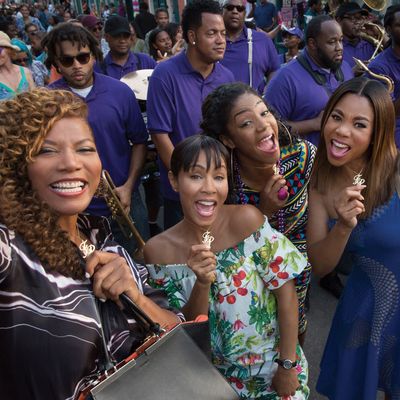
Will Packer has accomplished what many in Hollywood see as the impossible: He produced a movie about funny black women that people actually saw. And what a movie it was: From start to finish, grapefruit scene to Set It Off reference, Girls Trip is a rare delight. It reunited Queen Latifah and Jada Pinkett Smith. It featured Regina Hall pummeling a sausage. It parodied the quintessential ditzy white ally. And it gave us Tiffany Haddish — who, if you’ve seen any of her brilliant late-night segments, you’ll agree is a gift in and of herself.
Girls Trip has paid off quite literally, as well: To date, the movie has made $114 million (it cost just $19 million to make). And as of last week, it’s the first studio movie written, directed, produced by, and starring black talent to pass $100 million at the box office. Vulture hopped on the phone with Packer — busy developing his Haddish–Kevin Hart comedy. Night School — to talk about how thrilling it is to have made such a groundbreaking film, how he fought for Girls Trip to star four black women, and plans for a possible sequel.
First of all, congrats! How are you feeling right now?
Amazing! Are you kidding me? This is a good time to be Will Packer. It’s also a good time to be Queen Latifah, Jada Pinkett Smith, Regina Hall, Tiffany Haddish, Malcolm Lee — the team was amazing. I’m really happy to be a part of it. It’s been a really, really tough year for studio comedies, for theatrical comedies in general. To have one that came on the heels of a lot of high-profile ones that didn’t work, one that actually connected and resonated with an audience, it feels good.
In addition to this being a big moment for movies developed by and starring black talent, Girls Trip is the rare raunchy comedy to be a box-office success. It’s tough for R-rated comedies to perform at the box office, especially this summer.
I don’t know if they’ve all been R. It feels like just comedies in general, but certainly adult R-rated comedies, for sure. It’s interesting. Comedy content is way more pervasive than it’s ever been. You can get it online, on streaming, on television, on any number of digital platforms. Because there’s so much comedy content out there, it becomes harder and harder to stand out. You have to make something that’s worth actually leaving your home to see. There needs to be an immediacy, an urgency about that content.
This was a project that you really championed. How did you know that it would be something special when it was in development?
Girls Trip is a story that I knew. I had been to the actual [Essence] Festival multiple years; I knew it very well. I knew that there was a movie against that backdrop. You had all these women that would take this annual pilgrimage, almost, to go and enjoy each other and have fun and behave in a way that had nothing to do with how people were perceiving them, or how men would judge them. It was about these women just being authentically and organically themselves. That’s what we need. I’ve seen this movie before with white men. I’ve seen versions of this movie with white women. But we haven’t seen it with women of color. And so as a producer, part of my job is to find those types of opportunities, and to create content in spaces and with themes that we haven’t seen.
I’m always interested in hearing what kind of studio notes movies like this — which are seen as a gamble — get. At one point you said there was an idea to make Girls Trip with two black women, a white woman, and a Latina lead.
What’s interesting is that, just in general as you talk about creating movies, the conversation inevitably goes back to, “Who is the audience for the movie and is that audience big enough to support the budget of the film?” Universal was extremely supportive of this idea for a movie. Especially Donna Langley, the chairwoman. She was somebody who got it, right away.
There were conversations, once you get into the specifics of development, around if there’s a “broader version” of the film. This type of film starring these women had not been done before to this level of success, not as a comedy. But knowing this audience, I know the value of this audience, and I pushed them really hard with the studio. “We can do this, and we can do this with these actors, because that’s the most authentic version of the movie.” And, ultimately, they agreed.
With any film, you’re going to have all kinds of thoughts and notes and opinions that come in. When you’re doing something that has not been done 20 times before to great success, there’s going to be a level of risk that you’re taking, and a leap of faith from the studio side. Studios are in a tough position: They have to fund these movies, fund the marketing. To do that, you’re putting yourself in a risk position, and you’re doing everything you can to mitigate that risk while still taking a chance. It makes the film industry very interesting. It’s a creative industry undergirded by economic imperatives that we all have to operate under. It’s tough sometimes to balance it, but that’s my job as a producer.
Do you get anxious or superstitious before big releases like this?
I don’t know if anxious is the word, but I’m like a politician on election night. I’m literally checking in on what the numbers are every single hour of opening weekend. There are all these really complicated formulas that determine, based on what a movie makes at twelve o’clock at the matinee showings on the East Coast of the Friday opening weekend, you can extrapolate what it will probably make over the course of three days, and over the course of a full run. While I don’t subscribe to those numbers religiously, I do like to know what they are. I am constantly checking in. But I’m also checking in with real people on the ground. I’m checking in with people in cities across the country who are going into the theaters. I’m asking how was the crowd, was it sold out, how big was the theater, what were the demographics, what were the gender breakdowns of the audience, how was the response? I’m asking that of real people from New York, to L.A., to Dallas, to Atlanta, Memphis, Tennessee, and everywhere in between.
And what’s the best thing you’ve heard?
Without a doubt, my number-one favorite response that I’ve heard from audiences is, “You got it right, that is us, that is so real, that is so authentic, I know those women, I am those women.” When you’re talking about creating a fictional piece of content and people react to it in that way, in my opinion, there’s no higher praise.
What about the industry reaction? The success of Girls Trip feels like it could shift the landscape for black actresses and black women in comedy.
The lip service has been amazing. People have been very, very kind. I think it was Chris Rock who said [that] Hollywood is like a fraternity or sorority. That certainly has some validity to it. When you’re doing well, you’re popular in the frat. I said it jokingly, but it’s a good time to be Will Packer because there’s a lot of “attaboys” and pats on the back.
Now, what it will mean for black actresses specifically, comedies like this, movies that are led by actresses of color? We will see. I think it definitely opens the door for somebody else to come in and say, “Well, it’s in the vein of Girls Trip,” or “It’s not unlike Girls Trip,” “It’s got the tone of a Girls Trip.” That’s how our town works, and so this definitely opens the door for other projects that have similar elements to get a green light, where they perhaps wouldn’t have before, because there was no model of success to point to. I’m optimistic about that.
Are you already having conversations about a sequel?
We’re definitely talking about it. The only thing harder than opening a studio comedy today is opening a studio comedy sequel. [Laughs.] That’s the next challenge. I love our team. If anybody can do it, we can do it. It’s still a little early — the movie is still in theaters — but it’s something we’ve all thought about.





